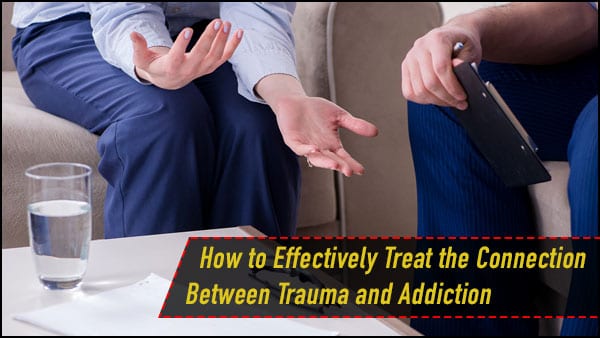As medical professionals do more research into the causes of addiction, they continue to draw a line between the effects of trauma (like depression and PTSD) and personal histories of childhood trauma and the development of addiction later in life. The connection between trauma and addiction is a strong one, and should not be treated as separate entities when working out a successful treatment plan.
The Link Between Trauma and Addiction
As mentioned in an earlier blog, the connection between trauma and addiction runs pretty deep. The most common links that mental health experts have noticed are those between PTSD and childhood trauma and addiction.
PTSD and Addiction
There is a strong correlation between Post-Traumatic Stress Disorder (PTSD) and addiction, where many veterans who have sought treatment for substance abuse also suffer from PTSD. In multiple groups, it was discovered that addicts with PTSD were, on average, more likely to experience a relapse than their non-diagnosed counterparts.
Childhood Trauma and Addiction
Traumatic events that occur in childhood seemed to have a large effect on the development of substance abuse disorders later in a person’s life. These traumatic experiences could range anywhere from physical and emotional abuse to neglect to experiencing an emotionally traumatic event (such as a divorce or incarcerated family member).
How to Effectively Treat It
In order to effectively treat both the effects of trauma and move into recovery from addiction, it’s important to treat both of those things simultaneously. These types of situations can quickly become a vicious cycle of using substances to cope with the effects of trauma, which can then, in turn, lead to experiencing more trauma through addiction. Then, the cycle repeats.
There are a few things to do in order to ensure that a person is finding care for both trauma and addiction. The first is to seek out trauma-informed addiction treatment, like working with a clinic that offers dual diagnosis treatment options, and the other is to participate in therapy programs that will help tackle the effects of PTSD and loosen its grip on life.
Seek Out Trauma-Informed Treatment
Trauma-informed treatment is a type of treatment program that treats trauma as a part of the addiction, working to increase the likelihood of substance abuse. Treatments will then tackle both the disorders borne out of trauma as well as the addiction. This type of treatment is also called a dual diagnosis treatment option.
Understanding the traumatic events that occurred in a person’s life and learning new ways to cope with the effects of that trauma (by finding healthier coping mechanisms, through various types of therapy, etc.,) is an effective strategy for then being able to tackle the effects of addiction and gives a better chance at remaining in recovery once rehab has been completed.
Treatment For PTSD
There are multiple types of therapies that can be employed to help find new ways to cope with the effects of PTSD. The most common types of therapy are:
- EMDR: Eye-Movement Desensitization and Reprocessing – With this therapy, a therapist will help recall the traumatic events that happened, and then focus on an object that is moving back and forth rapidly a few inches from the person’s face. This causes a bilateral engagement with the brain that allows the brain to shift the memory and make the recollection less painful.
- PE: Prolonged Exposure – This type of therapy is a “talk therapy” when a person works with a trained therapist slowly over a period of weeks to confront situations that they may have been avoiding as a result of the trauma, and speaks with detail about the traumatic event. Over time, participants are able to reduce their panic and fear response to the event by that exposure.
- CPT: Cognitive Processing Therapy – In this type of therapy, patients will work with a therapist to reevaluate what they think about a particularly traumatic event. If a therapist can change the way the person thinks about it, then they will be able to change the way they feel about it.
Cut the Feedback Loop Short
In order for PTSD and addiction treatment to be effective, a person has to keep themselves from falling back into the same vicious cycle as described above. By cutting that feedback loop short and working simultaneously to find new ways to cope and get clean and sober, a person has a better chance of being successful in efforts to find a more fulfilling, healthy life.
Trauma and Addiction Can be Treated to Find Relief
The connection between trauma and addiction is a strong link that must be worked on from both sides to find relief and recovery from addiction. By working with a specialized rehabilitation program that treats trauma disorders and addiction as two things that occur in tandem with one another, a person will be able to find new coping strategies for the high-stress situations that have occurred as a result of trauma and significantly reduce the risk of relapse. Trauma is connected to addiction, so they will be connected as a person moves into recovery.













